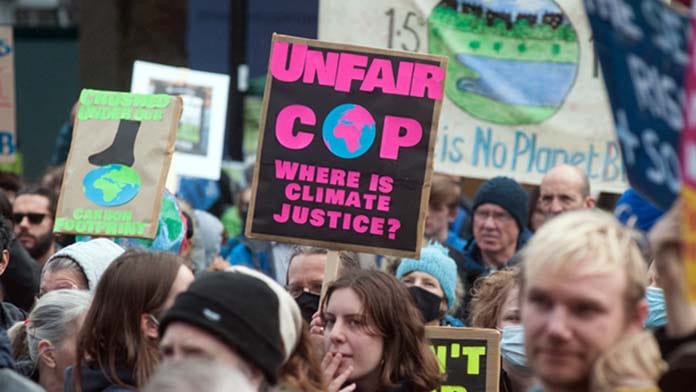World leaders promoted the Glasgow COP26 summit as a “last chance” to hold warming to the 1.5 degree limit agreed at the Paris summit in 2015. Yet it has ended in failure.
Early on there was talk of progress, as some countries announced new targets. Some claimed that the new pledges might keep warming to 1.8 degrees. But an assessment by Climate Action Tracker found that things were still far worse if near term targets are factored in, rather than just aspirations for 2050. Emissions will be twice as high in 2030 compared to what’s needed to keep warming to 1.5 degrees.
And beyond targets, the policies countries are actually implementing would take heating to 2.7 degrees, it found.
As climate activist Greta Thunberg put it, “Unless we achieve immediate, drastic, unprecedented, annual emission cuts at the source then that means we’re failing when it comes to this climate crisis. ‘Small steps in the right direction’, ‘making some progress’ or ‘winning slowly’ equals losing.”
Climate change is already bringing more extreme weather events, from record floods to extreme heat and bushfires, including Australia’s record Black Summer fires in 2020. Even at 1.5 degrees, climate disasters will be worse and more frequent. There is already the risk that the world is close to tipping points that will accelerate global heating so that it becomes unstoppable.
But our rulers are still not prepared to act.
Global heating is caused by the burning of fossil fuels. Yet the summit could not even agree on the aim of phasing out coal. This was replaced in the final agreement by a call to simply “phase down” the use of “unabated coal power”, accepting the idea that mythical technologies like carbon capture and storage might allow coal use to continue. This just means more delay and inaction.
There was even a push to remove the goal of limiting warming to 1.5 degrees from the agreement.
Kenyan Environment Minister Keriako Tobiko condemned the negotiations, warning, “For Kenya and Africa, 1.5 degrees is actually 3 degrees-plus,” since the planet does not warm evenly.
“In Kenya and Africa, we bleed and we cry,” he said. “We bleed when it rains, we cry when it doesn’t rain. For us, 1.5 degrees is not a statistic, it is a matter of life and death.”
Capitalism v the climate
The failure of the COP26 summit is no surprise. Governments around the world have continually failed to take the action necessary to curb emissions. This summit was only the most recent in 30 years of global summits that have failed to act.
Our rulers are far too committed to maintaining profits to do what’s necessary. Capitalism is a system based on competition. The governments more reliant on fossil fuel profits have again set out to defend the companies that profit from pollution. They fear that stronger action would damage their own economies more than those of rival states.
So Saudi Arabia, Russia and India, backed by Australia, demanded the removal of a call for an accelerated phase out of coal and fossil fuel subsidies.
And while the developed nations of Europe and the US talked about stepping up action, they still refuse to provide funding to compensate poorer nations for the costs of climate change. This is despite rich nations being responsible for the bulk of historical emissions that have caused global heating.
Rich countries have still not delivered the US$100 billion a year in climate finance for the Global South that they agreed to 12 years ago at the Copenhagen summit. A UN report said around $400 billion a year would be needed by 2030.
Shortly before the summit’s conclusion, China and the US announced plans to put aside geopolitical rivalries to work together to tackle climate change. But there were no new commitments to action announced, just plans for more talks.
Both countries have shown that their primary concern is the economic competition to dominate the 21st century. Neither is about to put this aside to share the technology and manufacturing needed to cut emissions.
Scott Morrison epitomised the problem when he claimed that “can do capitalism” was the only way to deal with climate change. In other words, he is only willing to see action if it can be made profitable.
In the meantime, his own projections out to 2050 show he wants to expand the burning of fossil fuels by exporting more gas, and keep digging up coal past 2050.
Those who run the system have shown they will not take the action needed. It is going to require a much more powerful movement from below, mobilising the power of organised workers, to fight for the action needed. The future of the planet depends on it.
By James Supple






